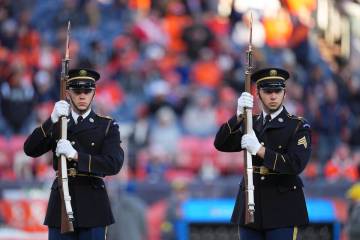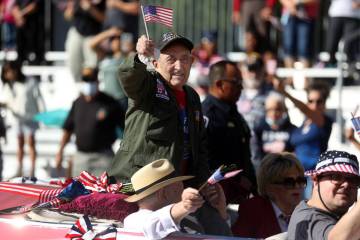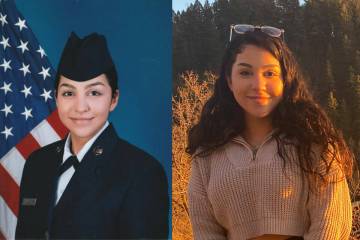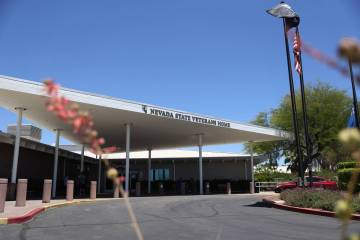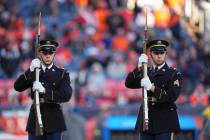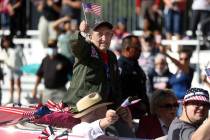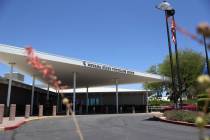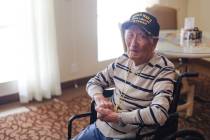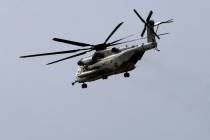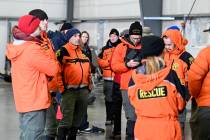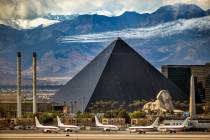Korean War buddies rekindle friendship
Sixty years ago they were a couple of buff, teenage Marines who shared the frontline trenches at the end of the Korean War.
Cpl. Donald Powell, the 18-year-old kid from a town near Cincinnati, carried a Browning Automatic Rifle.
Cpl. Vito Tomasino, 19, of Long Island, N.Y., slung an M-1 rifle with two bandoliers of ammunition and three hand grenades.
They were dug in along the 38th parallel when the three-year United Nations “police action” came to halt with the Korean Armistice Agreement on July 27, 1953.
They left separately in the months that followed. Like many “Always-Able, Stable-Able” buddies from Able Company, 1st Marine Battalion, 7th Marine Regiment, they drifted apart over the decades.
That was how it was until last month when Powell was sifting through some black-and-white photos from his Korean War days and said to his son, “I wonder if Vito Tomasino is still around.” And his son said, “Well, let’s find out.”
With the help of the Internet, they tracked down Tomasino and gave him a call.
“We talked for 40 minutes going over old things, and then he told me he was going to make it out to Vegas,” Tomasino said.
On April 23, Tomasino picked up Powell at McCarran International Airport to spend the rest of the week remembering the “Forgotten War.”
“It was really something special. I never dreamed something like this would ever happen,” Tomasino said.
Said Powell: “I cried. You think about 60 years, and then you see this person again. The emotion is awesome.”
FLASHBACK TO ’53
Looking back to when the conflict began in 1950, both Powell and Tomasino were in high school when they decided to join the Marines for different reasons.
When Powell was 17, his father gave written permission for him to join after trying to talk him out of it.
“My cousin was killed on the Inchon landing,” he said. “I told my dad, ‘I’m going to go into the Marine Corps.’ He said, ‘What for?’ I said, ‘I want revenge on John.’ ”
Like Powell, Tomasino also volunteered.
“I grew up during the second world war,” Tomasino said. “I felt kind of bad that I wasn’t able to do my part. I vowed that when I got out of high school, I was going to join the Marines and go to Korea.”
When his friends asked him why, he told them, “I just didn’t want anybody else taking a bullet for me. If it was meant for me, I wanted to be there to take it. It wasn’t so much patriotism or waving of the flag. I just felt it was my job to be a part of it.”
The “bullet” never found Tomasino although he endured suspenseful nights at his listening post and survived a few mortar strikes while eating a steak near the mess tent “a week to 10 days” before the truce.
“I don’t think they were trying to hit the tent. I think were just trying to let us know they were still there,” he said.
Powell’s scariest moment happened about the same time, July 17, 1953, when their buddy Pfc. William C. Lastinger was killed on a night patrol in the area around Hill 181 near the tooth-shaped ridge they called “the Molar.”
“We went on that one patrol, and we lost two men and got about six wounded,” Powell recalled.
“We had a lieutenant that was a little goofy,” he said. “We had lost our real lieutenant who was a mustang, a man who had come up through the ranks.”
The new lieutenant, who was fresh out of the service academy, “decided he wanted to go on patrol. So he picked my platoon.”
As they approached a knoll, the point man found a trip wire across the path.
“Well, he followed that trip wire, and he got shot. Then all hell broke loose.”
The skirmish with communist soldiers ensued as Powell’s platoon defended their position.
“My scariest moment was when I was coming off that patrol and they were shooting them 76 (mm) recoilless rifles at us. That’s like a cannon,” he said. “We’re coming back through that line, and those things are hitting all over the place. ... One of them hit, the next thing you know I said, ‘Oh my God, my leg.’ ”
Shrapnel hit the two ammo magazines in his pocket. “I’m glad they didn’t go off. The corpsman came down there and looked, and he said, ‘Well, I don’t see no blood, so it can’t be too bad.’ ”
The next day, his captain asked for volunteers to recover the two bodies. Powell and eight others stepped forward.
“This time I took an M-1 with me instead of my BAR,” he said. “I was just hoping somebody would stick their head up, but it didn’t happen. And then we brought them back.”
‘WAR WEARY’ NATION
After World War II, the United States was “war weary,” Tomasino said. That is why the Korean conflict was described as a “police action” instead of the war it really was with nearly 37,000 U.S. military deaths and about 7,900 who remain unaccounted for, according to figures the Pentagon revised in 2000.
“It was understandable that the American public would not be all that enthusiastic about entering into another war so soon after World War II,” Tomasino said.
“When we got back from Korea, there were no ticker-tape parades like in World War II. We just got off the boat,” he said. “I can understand that. Still, it was a whole lot better than the guys coming back from Vietnam, what they had to go through.”
Powell said after he got home to New Richmond, Ohio, “all the kids said, ‘Where you been?’ I said, ‘I’ve been in Korea, fighting.’ They said, ‘Korea? Where’s that?’ I’m thinking, ‘They don’t know what went on over there?’ ”
Decades later he was still frustrated. “It kind of irritated me that nobody seems to know what the Korean War is or what it was all about. ... It’s been forgotten.”
After the truce, Tomasino saw jets flying low over the scarred landscape and thought, “That’s what I should be doing.”
So after his honorable discharge from the Marines, he joined the Air Force and spent 22 years flying fighter jets until he retired as a major in 1978. He flew 3,000 hours in F-100 Super Sabres including 128 combat missions in Vietnam in 1964 and 1965.
“Despite how I felt about the war, I knew that what I was doing was worthwhile because I was protecting my troops on the ground,” he said.
Powell used the G.I. Bill to study electronics but decided instead to pursue a career with the Postal Service, working 30 years as a letter carrier in Cincinnati before retiring in 1989.
CONFLICT CONTINUES
Today, both men say the situation in North Korea hasn’t changed much since the armistice. The country’s young leader, Kim Jong Un , like his father, continues a dictatorship. The stakes are higher now, with Kim saber-rattling his nuclear capability.
“I think that what he’s doing is pretty much the same as what his father did before him and what his grandfather did before his father,” Tomasino said.
“He’s bluffing, and he has no intention of doing anything that might cause either the South Koreans or us to fire back at him. He knows if he does that, he’s going to be committing suicide,” he said.
Powell agrees but added, “I still don’t trust the man. I wouldn’t trust him for nothing in this world. I think he’s half crazy to start with, and I think if he got mad enough, he might try to launch a nuclear weapon.”
Contact reporter Keith Rogers at krogers@reviewjournal.com or 702-383-0308.





